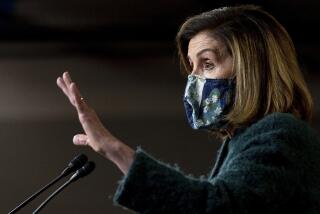Japan Blames Its Policies for Economic Ills
- Share via
TOKYO — In a stark admission of past failure, the Japanese government Sunday blamed official complacency, bad policy and missteps by bureaucrats and businesspeople for prolonging the nation’s worst recession since World War II.
The admission, issued by a relatively minor government agency, sends an important signal at home and to the global financial community and brings the government’s official view closer in line with that of the United States and other economic allies.
In its year-end report, the Economic Planning Agency said Japanese officials and companies for years avoided painful steps needed to recover from the bursting of Japan’s speculative “bubble” economy of the 1980s, a collapse that sent real estate and stock prices plummeting and left banks holding hundreds of billions of dollars in bad loans.
Instead of facing the problem head-on, however, government bureaucrats and bank officials opted to “leave the embarrassing problem untouched,” the EPA said.
The price that Japan ultimately paid after the bubble burst was enormous, the agency report said, as businesses and households suffered a combined loss of $7.2 trillion between 1990 and 1996, roughly 1.7 times the nation’s 1996 gross domestic product.
Analysts here largely viewed the report as a welcome, if overdue, dose of reality from a government that repeatedly has glossed over problems. But the more important question now is whether Japan’s leaders will use it to alter basic policies, restructure inefficient sectors and reduce the bureaucratic grip on the economy. And on that count, most analysts are decidedly pessimistic.
“I appreciated the fact that the government is finally admitting its mistakes 10 years after the collapse of the bubble,” said Yasunari Ueno, chief economist with Fuji Securities. “But I don’t believe this will alter the government’s economic policies any time soon.”
Until that step is taken, analysts say, a turnaround of the world’s second-largest economy is likely to remain elusive. “Structural problems are not being corrected,” said Chang Yi, an analyst with Kokusai Securities. “This situation could continue for a long time.”
One problem is whether Sunday’s report will have any lasting resonance. The EPA is a small player within the government’s bureaucratic maze and lacks the clout of the all-powerful and politically connected Finance Ministry. Hiroshi Sakurai, an analyst at Kankaku Research Institute, believes that the EPA might have released its candid report to pave the way for other politically unpopular measures such as a tax hike.
“You’ve got to wonder why they’re admitting their faults at this time,” Sakurai said.
The release of the report coincides with some of the more aggressive steps taken by Japan’s Financial Supervisory Agency, which is trying to restructure the nation’s troubled financial system. This month, for instance, the FSA moved quickly to take over Nippon Credit Bank and only days ago announced that the top 17 banks had $46 billion more in questionable loans than previously acknowledged.
But other factors that augur poorly for permanent reform in the wake of the EPA report include the ruling Liberal Democratic Party’s continued dominance of national politics and its traditional business constituents who have an immense stake in the status quo. Also, the huge government spending programs designed to stimulate the economy are still being poured into the debt-laden construction industry and other sectors with little noticeable economic impact.
For Japan, however, the problem goes far deeper than the immediate economic issues--which might partly explain the nation’s apparent paralysis. After following a very successful, largely government-led economic model for several decades after World War II, many of Japan’s most basic economic, political and corporate structures are proving ineffective all at once.
Tackling so many important and powerful vested interests at the same time, even as Japan tries to come to grips psychologically with its fall from grace, has left it without a vision of the future. Japan lacks important social welfare systems needed to buffer layoffs and pave the way for painful restructuring. Furthermore, a rapidly aging population is causing additional strains even as a weak political opposition and consensus-based decision-making further slow efforts to challenge the status quo.
The stakes in this debate are high, not just for Japan but for Asia and the West as well. The United States and other industrialized nations want Japan to turn around its beleaguered economy as soon as possible to avoid further erosion of global economic growth.
According to the EPA report, the fallout from the bubble economy reduced Japan’s economic growth rate by about 2 percentage points on average annually from 1991 to 1993 and 0.8 points annually from 1994 to 1996.
And over the holiday weekend, Japan announced that unemployment in November hit a record 4.4%, matching the level in the United States. Business confidence is extremely low as is capital spending and household consumption while Japan remains firmly mired in its worst recession since the end of World War II.
The EPA said some of the major reasons why Japan failed to act sooner include its belief that prices would soon recover, the banking industry’s delay in dealing with bad loans, the lack of a national framework to handle those nonperforming loans and weak transparency within the financial system.
But the report also lashed out at international credit rating agencies for downgrading Japan’s sovereign debt, given the nation’s continued status as an economic power. “The threat of Japan not being able to pay back its foreign debts is extremely small,” the EPA said, citing Japan’s extensive overseas credit, current account balance and foreign reserves.
Etsuko Kawase of The Times’ Tokyo Bureau contributed to this report.
More to Read
Sign up for Essential California
The most important California stories and recommendations in your inbox every morning.
You may occasionally receive promotional content from the Los Angeles Times.













